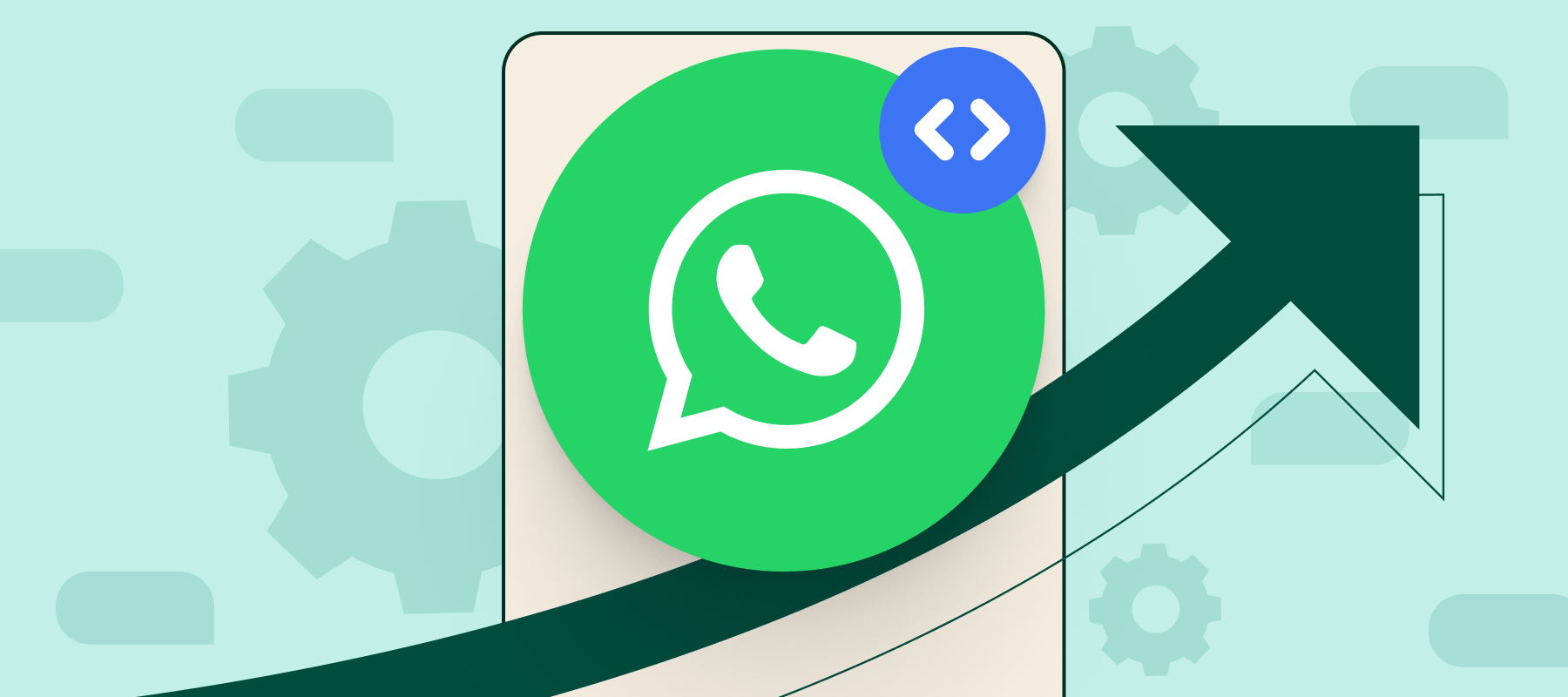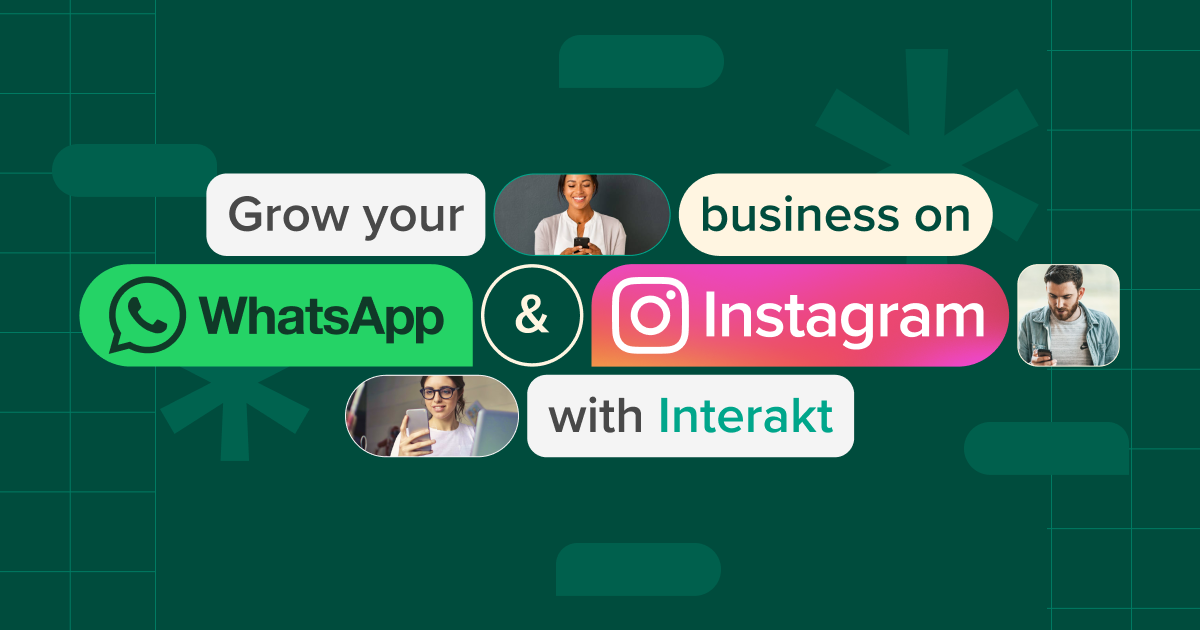If you’re thinking about automating your business on WhatsApp, you’re in the right place.
The WhatsApp Business API offers many opportunities to facilitate communication and improve customer interactions.
Automation can save time, ensure quicker responses, and simplify conversation management.
Whether you’re just getting started or looking to refine your current processes, the strategies we’re about to share can help you scale your business and make the most of WhatsApp automation.
Understanding WhatsApp API
WhatsApp API is a solution designed for businesses to integrate WhatsApp into their communication systems. Unlike the regular WhatsApp Business app, it allows for large-scale messaging, automation, and CRM integrations, making it ideal for customer support, notifications, and marketing.
However, the API itself isn’t a plug-and-play tool. It requires technical expertise to set up, as there’s no standalone interface. This is where API providers come in—they simplify the process by offering platforms that help businesses use WhatsApp automation without dealing with complex backend configurations.
Key Automation Strategies Using WhatsApp API
Here are some key automation strategies for using WhatsApp API:
1. Automating Customer Support
Handling large volumes of customer queries can be overwhelming without the WhatsApp API.
However, integrating it into customer support streamlines inquiries, allowing businesses to deploy automated responses and chatbots. This helps resolve common queries instantly, reducing the need for human intervention and ensuring customers receive quick, efficient support, leading to higher satisfaction and operational efficiency.
The Souled Store, a popular D2C brand in pop culture merchandise, struggled with limited engagement due to traditional, one-way communication. Their existing methods lacked interactivity, making it hard to build deeper connections and maximise customer engagement.
They integrated Interakt’s WhatsApp Business API to fix this, using chat assignments, a no-code chatbot builder, and custom auto-replies. These tools enabled automated conversations, faster responses, and audience segmentation for personalised interactions.
During the Black Friday campaign, they sent WhatsApp notifications to 25,000+ customers, achieving an impressive 42% engagement rate with their chatbot. This increased customer satisfaction and provided valuable data for targeted marketing, helping them refine their approach for future campaigns.
2. Streamlining Marketing Campaigns
Traditional marketing channels are no longer as effective in engaging audiences.
Emails often go unread, with an average open rate of just 21.33%, while WhatsApp messages boast an impressive 98% open rate. This difference highlights why businesses are shifting towards WhatsApp marketing for more direct and impactful communication.
Integrating the WhatsApp Business API can increase the return on your marketing efforts. Bulk notifications, quick replies, and automated flows allow businesses to send personalised messages directly to customers, increasing engagement and conversion rates.
YourStory, a leading platform for startup stories, struggled to convert audiences for its events. Traditional methods like email invitations had low engagement, lacked personalisation, and failed to bring sufficient attendance.
To fix this, they integrated Interakt’s WhatsApp Business API, using WhatsApp broadcasts to send event invites at scale. Quick replies enabled instant responses to attendee queries, while analytics helped track and refine outreach strategies.
The results were significant – YourStory saw a 63% increase in attendee conversion rates and a 95% spike in message delivery rates.
3. Enhancing Sales Processes
Sales teams often struggle with delayed follow-ups and missed opportunities. The WhatsApp Business API helps businesses automate lead nurturing, send timely follow-ups, and respond instantly to customer inquiries.
For instance, an automobile dealership can use WhatsApp automation to send personalized car recommendations based on customer preferences. After an inquiry, the system can automatically share brochures, pricing details, and test drive booking links, ensuring quick engagement and reducing sales drop-offs.
With WhatsApp, businesses can keep prospects engaged without overwhelming their sales teams, resulting in faster conversions and better customer experience.
4. Managing Appointments and Reservations
Manually handling bookings can lead to scheduling conflicts and missed appointments. The WhatsApp Business API allows businesses to automate appointment confirmations, send reminders, and handle rescheduling.
For example, a dental clinic can use WhatsApp to automatically confirm bookings, remind patients about upcoming appointments, and even allow them to reschedule with a quick reply. This reduces no-shows and improves efficiency.
Best Practices for Implementing WhatsApp API Automation
Here are some best practices for implementing WhatsApp API automation effectively:
1. Define Clear Automation Goals: Identify specific objectives before implementing WhatsApp API automation. Whether improving customer support, increasing sales, or streamlining marketing, setting clear goals assures the automation aligns with business needs and delivers measurable results.
2. Use Pre-Approved Message Templates: WhatsApp has strict guidelines for business messages, meaning you can’t just send anything. You need pre-approved message templates for outbound communication, especially for promotional or transactional messages. Keep them clear, engaging, and relevant to increase approval chances.
3. Integrate with CRM for Personalized Communication: Connecting WhatsApp with a CRM system allows businesses to track customer interactions, segment audiences, and send personalized messages based on user behaviour, resulting in higher engagement and improved customer satisfaction.
4. Set Up Chatbots for Common Queries: Deploying chatbots helps automate responses to frequently asked questions, such as order status or business hours. This reduces the workload on support teams while ensuring quick and consistent customer interactions.
5. Enable Smart Routing for Efficient Query Handling: For businesses with multiple departments, smart routing ensures customer inquiries are directed to the right team, reducing response time and improving resolution efficiency. This is especially useful in customer support and sales operations.
6. Use Rich Media for Better Engagement: Improve interactions using images, videos, PDFs, and interactive buttons. Sending product demos, catalogues, or promotional videos makes conversations more engaging and helps customers make informed decisions.
7. Automate Follow-Ups and Notifications: Set up automated follow-ups for abandoned carts, appointment reminders, or post-purchase engagement. This keeps customers engaged and ensures essential updates aren’t missed.
8. Monitor Performance with Analytics: Track key performance metrics such as open rates, response times, and customer interactions. Analysing these insights to refine automation strategies and future WhatsApp campaigns.
9. Balance Automation with Human Support: While automation improves efficiency, some interactions require a human touch. Provide an easy way for customers to connect with live agents when needed, ensuring a consistent customer experience.
10. Ensure Compliance with WhatsApp’s Policies: WhatsApp is strict about spam and unsolicited messages. To avoid being flagged or banned, obtain customer consent, follow messaging guidelines, and use automation responsibly. A good rule of thumb? If the message doesn’t add value, don’t send it.
Choosing the Right WhatsApp API Provider
Here are the key factors to consider when making your choice:
Official vs. Unofficial API Providers
WhatsApp offers official API providers approved by Meta, ensuring compliance, security, and reliability. On the other hand, unofficial providers may offer cheaper solutions but come with risks like policy violations, account bans, and lack of direct Meta support. Choosing an official provider ensures long-term stability for your business communications.
Compliance with WhatsApp’s Business Policies
WhatsApp enforces strict business policies and guidelines to prevent spam and unauthorised messaging. A reliable API provider ensures adherence to these policies, reducing the risk of message restrictions or account suspensions. Compliance also helps maintain customer trust and provides better business operations.
Integration Capabilities with CRM and Business Tools
A good API provider should offer easy integration with CRM platforms like HubSpot, Salesforce, or Zoho. It should also connect with e-commerce, ticketing, and support tools to simplify workflows, automate responses, and improve customer data management.
Scalability and Multi-Agent Support
As your business grows, scalability becomes crucial. The ideal provider should allow you to scale messaging volumes, support multi-agent access, and provide a shared team inbox to efficiently manage high volumes of customer interactions.
Automation and Chatbot Features
A strong API provider should include automation capabilities such as chatbots, auto-replies, and flow automation. This ensures faster query resolution, reduced human workload, and 24/7 customer support, improving overall efficiency.
Pricing and Cost Structure
Different providers have varied pricing models—some charge per message, while others offer subscription-based plans. Choose a provider with transparent pricing, no hidden fees, and cost-effective solutions that align with your business scale and messaging needs.
Security and Data Privacy Measures
Since WhatsApp handles sensitive customer data, security is a priority. To protect user data and prevent breaches, opt for a provider with end-to-end encryption, GDPR compliance, and secure cloud storage.
Customer Support and Service Reliability
Technical issues can arise sometimes, making customer support crucial. A good API provider should offer 24/7 support, quick resolutions, and dedicated account managers to handle technical problems efficiently. This ensures minimal downtime, smooth operations, and uninterrupted customer communication.
Analytics and Performance Tracking Features
A reliable provider should offer detailed analytics to track message delivery, open rates, and customer interactions. These insights help refine strategies, optimize campaigns, and improve overall engagement.
Conclusion
Partnering with a reliable API provider is essential to implementing WhatsApp automation effectively, and that’s where Interakt comes in.
With automated chat flows, smart segmentation, real-time analytics, and more, Interakt enhances customer communication and engagement, making interactions seamless and efficient.





